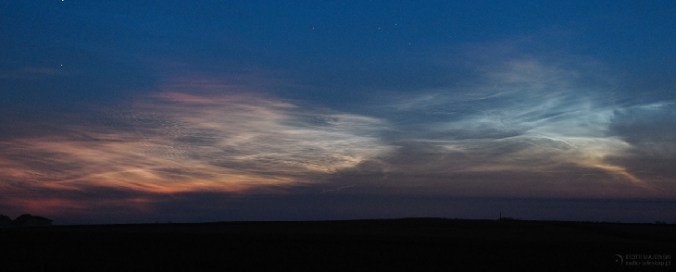July 28, 2020: Noctilucent clouds (NLCs) are supposed to be electric blue. This past weekend in Sweden, photographer P-M Hedén saw a different color: Dark Red. “My 17 year-old son was out with friends and he texted me the message ‘Noctilucent!’ I looked out and didn’t really understand what I saw. The tops of the clouds were red.”
Hedén hopped in his car and drove to a clear site for a better look. The movie he made, above, shows the dynamics of the clouds and the development of their amber crown. “This all happened around local midnight,” he says.
NLCs are Earth’s highest clouds. Seeded by meteoroids, they float at the edge of space 83 km above the ground. Hedén’s video shows ordinary clouds scudding dark and low across the Swedish landscape. NLCs float high overhead, catching the rays of the sun, which is still “up” at their extremely high altitude.
This isn’t the first time people have seen red noctilucent clouds. There was a significant outbreak of red NLCs over Europe on June 21, 2019. However, they are rare and not fully understood.

Above: Red NLCs over Piwnice, Poland. June 21, 2019. Credit: Piotr Majewski
To understand what makes NLCs red, first we have to ask What makes them blue? The answer is ozone. Research in the 1970s revealed that much of the sunlight hitting noctilucent clouds first passes through Earth’s ozone layer. Ozone absorbs red light, while allowing blue to pass. This filtered light gives NLCs an azure hue.
The origin of red is less certain. One idea, probably the best, comes from a 1988 paper in the Journal of Atmospheric and Terrestrial Physics entitled “The coloured edge of noctilucent clouds.” The authors note that “Noctilucent clouds are illuminated by sunlight which passes obliquely through the atmosphere. The lowest rays may pass only a few kilometres above sea level.” These low rays are strongly reddened (like sunsets) and bent by refraction; some of them may be redirected to the tops of NLCs.
Is that right? Even many specialists in NLC research aren’t sure, which means every sighting is a bit of a mystery. Northern sky watchers, if you’re seeing red, submit your photos here.
Realtime Noctilucent Cloud Photo Gallery
Free: Spaceweather.com Newsletter
